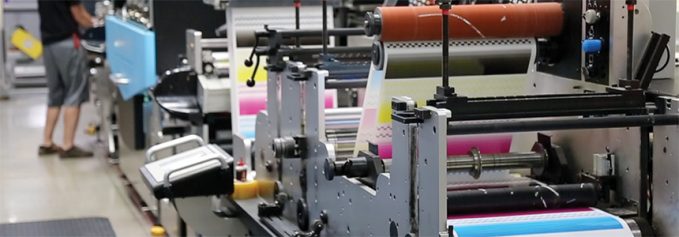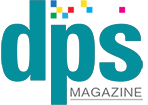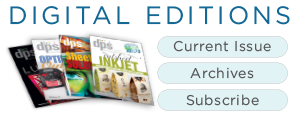
By Olivia Cahoon
With digital printing capabilities, the possibilities for brand owners and industrial markets are seeming endless for label and packaging applications, enabling variability, short runs, and faster turnarounds. Both traditional converters and digital print providers look to the latest label printing systems to enable innovation with creativity and efficiency.
Above: TLP introduced digital label printing to its shop in 2015.
Succeeding with Dry Toner
Guru Labels is a family owned and operated label print provider in Tuggerah, New South Wales. Since 2001, it has supplied self-adhesive labels.
In 2019, the company expanded its services and space by moving into a 36,000 square foot facility. With a staff of 20, the shop offers advisory services including expertise, creative design, and high-technology digital label production for multiple markets in Australia.
“We have an in-house web platform and dedicated IT department that builds and monitors individual online web portals for each customer,” shares Nick Lowe, owner and sales director, Guru Labels.
For 18 years, the print provider has offered quality labels for a variety of industries from automotive to food packaging, glass, and glazing.
When the company first opened, it outsourced its work to a range of print partners. According to Lowe, Guru Labels didn’t have the control with this setup to meet deadlines efficiently and decided to bring every process and procedure in house. This allowed the shop to create a more forward-thinking and customer-centric business model.
Guru Labels invested in a Xeikon digital press based on its dry toner technology. “Their dry toner technology gave us greater capability for a larger number of applications,” says Lowe.
Today, the shop runs two Xeikon 3300 digital label presses printing CMYK with white at 1,200 dpi and speeds of up to 63 feet per minute. According to Lowe, this model is proving successful and provides the shop with the confidence to grow its business.
“We continue to invest in the most advanced systems and the latest print technology to meet our customers ever-growing needs and expectations,” he adds.
Since investing in the second Xeikon 3300 digital label press, the shop pushes its boundaries. “It is without doubt the best machine out there to help us differentiate ourselves. Apart from the opportunity for multiple applications, Xeikon’s dry toner is certified for food safety compliance,” shares Lowe. Other advantages include the ability to produce graphics with hidden security features, exceptional color and finish, and high levels of sharpness and accuracy.
Printing with Xeikon’s technology and equipment gives Guru Labels an edge over the competition. “Our customers absolutely love the labels that come off the Xeikon machines,” says Lowe.
With its digital presses, Guru Labels provides a large library of labels for multiple sectors such as automotive, food, health and beauty, industrial markets, mechanical manufacturing, pharmaceutical, and wine and spirits. Carton and transport labels, health labels, quick response barcodes, tamper-evident labels, and window decals are among its popular requests.
Guru Labels plans to push forward and move into new markets with the creative capability afforded by Xeikon equipment.
Industrial Labels
Established in 1984, Tailored Label Products, Inc. (TLP) is an industrial label printer and converter headquartered in Menomonee Falls, WI. The company operates a manufacturing facility in Suwanee, GA and a distribution center in Monterrey, Mexico.
With over 130 employees, TLP offers converting, die cutting, flexographic, digital, and screenprinting services with an international outreach. Its Menomonee Falls facility houses 55,000 square feet of workspace.
TLP takes pride in its commitment to label and die-cut adhesive needs. Its facilities use a quality management system that is ISO 9001:2015 and IATF 16949:2016 certified. ISO 9001:2015 is acknowledged as the fundamental quality management system while IATF 16949:2016 defines the requirements for organizations in the automotive industry.
With these certifications, the shop offers improved on-time delivery, reduced defects and waste, and enhanced product process quality with tools like failure mode effects analysis.
In addition to label products, TLP offers in-house design and testing capabilities. The TLP Quality & Engineering Lab integrates throughout the product development process and is positioned to solve label and adhesive challenges. Its compliance to the automotive industry’s exacting demands brings additional benefits to all TLP clients including color consistency, design and process reviews, durability tests, engineering analyses, exact measurements, and thorough documentation.
TLP introduced digital printing equipment to its label production operation in 2015. “Our customers require much shorter run quantities and shorter lead times,” shares Lindsey Muchka, senior marketing manager, TLP.
When the label provider first considered investing in digital technology, it looked for durable inks and the ability to consistently match spot colors on an array of substrates. Shortly after, TLP selected the Fujifilm Graphium UV inkjet hybrid press designed for durable labels and specialty print. “We had high confidence with the Fujifilm team in supporting us after the purchase,” offers Muchka.
Graphium’s digital ink allows converters to move from screen or flexography to digital for the first time. The press prints up to 13,240 square feet per hour with up to 1,080 dpi. It handles paper from 13.8 to 16.9 inches including cast-coated, coated, high-gloss, metalized, thermal, and uncoated materials.
With the Graphium press, the company operates under a hybrid environment that augments digital, flexographic, and screen printing technologies. “Even without the digital print it’s a good flexographic press with full laminating and converting capabilities inline,” adds Muchka.
By investing in digital printing technology, TLP increased service offerings. “It has opened doors for us such as on boarding programs with high SKU counts. We can do so without plate charges,” shares Muchka.
Compared to alternative technologies, Muchka believes digitally printing labels provides shorter lead times, reduced makeready times, and less material usage. In addition it has allowed them to attract and retain younger talent.
In the next few years, Muchka sees TLP adding more digital technology as well as automation to its press room. “All of which will help us reduce costs and add more value for our clients.”
The company currently offers a variety of labels, tags, and prototypes for industrial manufacturers. Examples of custom applications include die cut adhesives, digital labels, dome labels, harsh environment labels, industrial prototypes, medical and laboratory labels, protective masking labels, regulatory labels, shipping labels, and supply chain compliance labels.
For labels that must withstand harsh environments, TLP delivers durable options. As some specialty materials are difficult to work with, the company creates new configurations and processes that exploit their unique properties.
TLP harsh environment labels provide maximum resistance to factors such as abrasion, acetone, chemicals and solvents, extreme heat and cold, hydraulic fluid, isopropyl alcohol, low surface energy plastics, powder coat paint, UV, and water. These labels are ideal for aerospace, alternative energy, appliance, automotive, biomedical, electronics, and outdoor power equipment markets.
Recently, an industrial OEM approached TLP to incorporate new regulatory guidelines to its branding and instructional labels. The repeat client requested new labels across its family of products.
“Due to the sheer quantity of labels and variations, the sales cycle to production parts was lengthy,” explains Muchka. “Because the versioning we’ve seen on this family of labels, we knew the digital press was the best fit.”
Using the Fujifilm Graphium press, TLP ran 40,000 square feet of labels inline, back-to-back, without stopping or starting the press, setup times, or plate changes.
According to Muchka, digital technology improved TLP’s efficiency for exactly these types of jobs. “Materials, sizes, and tooling remains the same, but imagery and text is changing on demand via the digital heads.”
A Little of Everything
In 1984, Slade Sharpsteen founded Sharp Printing, Inc. in Sanborn, NY. Its name changed to Sharp Labels & Printing in 2018. The current plant hosts 6,000 square feet of workspace with eight employees that keep production running from order entry to completion and fulfillment.
As a full-service printer, Sharp Labels & Printing started offering labels in 1984. The company expanded its capabilities in 2015 with the Epson SurePress L-4033AW. According to Slade Sharpsteen, president, Sharp Labels & Printing, the addition added ease and efficiency to high-volume runs. “It also provides valuable color capabilities that continue to impress our clients.”
The shop added a second unit—the Epson SurePress L4533AW—in 2018. With its current print system of dual Epson presses, Sharpsteen says Sharp Labels & Printing benefits from efficient layout features, powerful workflow tools, and superior color management. The additional unit affords a quick turnaround time to meet client’s business needs.
In the near future, the shop is looking forward to adding a Grafotronics SCF 350 die finisher that will allow cold foils plus UV and spot varnish.
In addition to the Epson presses, the labels provider also runs digital equipment including two Canon imagePRESS C810 digital copiers, the Canon Pro 4000 wide format printer, and the Xanté envelope carbon-less form and variable data printer. The shop also has an Aztec converting system, Primera FX1200 digital roll label finishing system, rotary die cutter, and Teco Rewind Inspection Machine/Table.
With its digital equipment, Sharp Labels & Printing offers a range of label substrates to its customers. For example, a local client utilizes booklet labels, shipping/carton, and drum and hazard labels. The labels are used internationally by their subsidiary companies and vendors as well. “We provide small and large runs with normal turn times,” says Sharpsteen.
Since investing in digital printing, the company has expanded its client base and added a sales representative. Sharp Labels & Printing now handles a more diverse label audience, specializing in small runs with quicker turn around. The labels provider is currently working closely with product label startups and private label businesses. Sharpsteen comments, “from logo to label design, we work closely with the client’s manufacturer needs and specifications.”
One satisfied customer is a local spice business—Kissed By The Sun—located in Amherst, NY. Since 2017, Sharp Labels & Printing produces their pressure-sensitive product labels for all eight of their bottled seasoning flavors. The client typically orders 200 to 1,000 labels for each flavor per run. “They are colorful labels printed on gloss white paper,” says Sharpsteen. The shop typically runs exact reprints for the client within a four-day turn time.
By investing in digital printing technology for label production, Sharp Printing & Labels provides prototype labels and small runs efficiently “We can easily integrate them into our larger runs,” shares Sharpsteen. “Our digital workflow provides cost-effective proofing so our clients can see, feel, and be assured of all their labels needs met.”
Grow With Technology
Guru Labels, TLP, and Sharp Printing & Labels each recognize the benefits digital print technologies can offer label production, including expanded color gamut, increased speed, and new applications. With the right technology and expertise, digital label printing and finishing solutions provide a significant opportunity for those looking to make the investment.
Jan2020, DPS Magazine



